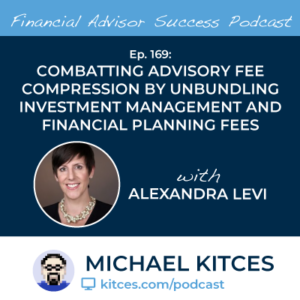
In the midst of the global coronavirus pandemic, people around the world are experiencing tremendous stress and anxiety, and financial advisors are fielding worried calls and emails from clients who need to be calmed. Yet the reality is that financial advisors aren’t immune, and are also dealing with exceptionally high levels of stress, both in being on the receiving end of clients seeking reassurance or looking to vent, and facing their own business stress in these times of extreme uncertainty. And in dealing with these prolonged periods of stress, financial advisors, as with other professionals in high-stress environments, face the crucial challenge of taking care of their own health and mental well-being to avoid burnout.
In our 31st episode of Kitces & Carl, Michael Kitces and financial advisor communication expert Carl Richards talk about the stress that many advisors face today (especially as many of their clients look to them as “release valves” for their own anxiety), and share some wellness tips that advisors can use to manage these high stress levels.
The first step in managing stress is to simply acknowledge that the stress exists, that the conditions contributing to the stress are often a challenging part of our job that must be dealt with, and that measures need to be actively taken to mitigate the impact of that stress on ourselves.
Some simple strategies that can help to reduce stress include basic breathwork exercises (such as taking a short break to take 10 deep breaths every 90 minutes during the day), regular exercise (taking a walk around the block), a good night’s sleep, finding healthy snacks (like no-butter popcorn or dark chocolate), and even just keeping a full glass of water within reach at all times to help stay hydrated. Because in times when everything feels out of control, having simple actions to remind us that there are things that we do still have the ability to control can be both mentally reassuring and emotionally comforting.
And even though each of these small ‘micro-actions’, by themselves, may not feel beneficial to or impactful on our health, doing them repeatedly, over time, can be effective ways to stay healthy. Because not only will they help us create healthy habits in the long run and experience a greater sense of control in our lives, but making conscious choices that promote good health (e.g., walking, drinking water, getting a good night’s rest, deep breathing) can also help us avoid unconscious choices that are unhealthy or just serve to stress us out even more (e.g., stress eating, binge-watching or listening to alarming news all day, checking email and social media instead of going to bed at a sensible hour).
Ultimately, the key point is that as many financial advisors are currently facing high levels of ongoing stress, it is critical for them to maintain their own physical and mental health. By taking simple steps, advisors can protect their own health and mental well-being… while making sure that they’re able to continue to provide great service for their clients!







 Welcome back to the 167th episode of Financial Advisor Success Podcast!
Welcome back to the 167th episode of Financial Advisor Success Podcast!

